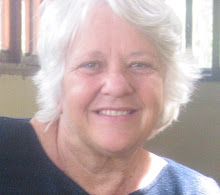(Look for my next post in two or three days as I'm off to the farm with no internet connection for a while.)
This morning I decided to see if I could find this blog on Google, typing in 'global warming' and 'blog' - result? over 7 million sites with no mention of this one. I kept trying with word combinations until 'blog, walk, grandchildren' brought up 'forallthegrandchildren' in third place.
In the meantime I became aware of the amazing amount and variety of blogs on the subject. Two days ago I was bemoaning the fact that no one was writing about conservation, but here is someone who mentions it two years ago:
Climate Ark
www.climateark.org/blog
January 9, 2007
Personal Sacrifice and the Climatic System
"As the science of climate change becomes more widely known, we are entering a period of angst where the reality of climatic system collapse is accepted, yet the search for climate solutions lags. One dispute is to what extent individuals must sacrifice modern conveniences to reduce emissions such as driving less, eating less meat and many other energy conserving activites; or whether the required necessary changes are of such a scale like public mass transit, global carbon caps and a carbon tax, which can only be carried out by governments. Given we must reduce emissions dramatically, by some 60% and perhaps more as soon as possible, the answer is both. I am very disappointed in Tony Blair's recent statement that we should all carry on with our air travel because science will find and answer to the problem. The hard reality is that some degree of personal sacrifice is going to be required."
So, what have we all been doing in the past two years? I for one have been slow to alter my habits and still have a long way to go in lowering my carbon footprint. I have a concern around air travel: when asked about the purpose of a trip, business and leisure or vacation appear as the main choices; I would like to add family as a purpose separate from the other two. The reality in this age of great mobility is that many of us must travel to see our children and grandchildren, and it would be unwise to stop nurturing those connections. Right now I'm in Brazil to visit my son and his family, flying back to the States next week. So I will continue to work on conscientious travel, and lowering my footprint in other ways.
If you haven't done so already you might want to calculate your own carbon footprint. You can find many online instruments to help you with this calculation if you google 'carbon footprint.'
Or just go to www.carbonfootprint.com





